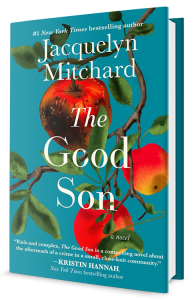Jacquelyn Mitchard on her Unusual Writing Process
Doing it My Way
 I’m fairly certain that most other people who write novels don’t write novels in the way that I write novels.
I’m fairly certain that most other people who write novels don’t write novels in the way that I write novels.
Having met a good many writers in my life, I’ve been able to count up exactly one other who follows the steps I follow to complete a narrative.
It’s eccentric.
It’s probably more difficult.
Now I should be able to say, after 23 books … “but it works!” However, I’m not sure it entirely does work.
I start at the beginning, really the beginning.
For example, until I have a title, I can’t allow myself to write a first sentence (the title may change but it won’t change because I change it. For my most recent novel, The Good Son, I came up with 25 titles, finally settling on My Only. My editor, whom I love but .. hey .. came up with The Good Son, saying it was more commercial – which it indeed probably is, as it’s been used a dozen times. I don’t like that. Further, the editor seemingly was the only one who loved the title.)
Before I proceed to write, I have to know almost entirely how the story will go – what will happen and when, whose story it is, and how it will end. As I tell students, I would never show up at the airport with the idea of going somewhere warm. I would know that I was going to Miami, and on what airline, and where I was staying and for how long.
I write a first sentence that is as close to perfect as it can be.
In fact, for The Good Son, many people have said that my first sentence is pretty darned closet to perfect altogether. It comprises those values usually endorsed for openings, as it is compelling, informational and inviting: I was picking my son up at the prison gates when I caught sight of the mother of the girl he had murdered. (I sweated blood over that first sentence, and I defy you not to read a book that begins with those words …)
After I finish the first sentence, I write the book in order – from the beginning to the end. If I get stuck, I don’t go on to another section and promise myself to come back later and amend the rough spot. I chew on it, sleep on it, pick it apart and put it back together, until finally it works.
Only then do I permit myself to go on.
Most of the really good and successful writers I know say that they really start to know the end of the story just before they get to the big climax, which often is about three-quarters of the way through the narrative. That’s not the case for me: I know it at the beginning, almost down to the last words.
You might tell me that this method is rigid and I would agree. It leaves little room for adventure and spontaneity and I would agree. In my experience, adventure and spontaneity (whether on a driving trip or in writing a story) often starts with a terrific inspiration and ends at a sinister hotel with a broken windshield.
I stick to the plan, at least in a general way.
In order to be able to stick to the plan, I must emphasize that I’ll have been thinking about that plan (planning the plan) for many weeks or months before I put it in motion.
Of course, when I complete a story, my agent sees it and he reliably has twenty ideas for improving the story or for plugging the holes through which it is hemorrhaging plot – and he is usually right. (“I don’t see the reason for that guy being a priest at all, how does that matter? And Chapter 22 is mostly just a long droning conversation between her and the old lady, why wouldn’t you just summarize that?”)
So I make those revisions.
When the publisher gets the novel, the editor has his or her own questions. (“I always assume that guy turned out to be a priest, and why don’t we ever see the main character directly asking her grandmother about what she did during the war? The book seems to skip from Chapter 21 to Chapter 23 without answering any of the reader’s questions!”)
So I revise the revisions.
Other and possibly more accomplished authors write two or more full drafts, getting everything down “on paper,” even if not in the final form. To me, this is a horrifying prospect: Write a novel is like building a cathedral. Would you just get the walls up any old way to see how it would look eventually? Of course, you would not. You would lay down a firm foundation and then carefully build the frame, then the walls, then craft the window frames, finally finishing with the paint and the trim. I polish the knocker on the door. It’s finally a book.
Everybody does it differently. I’m sure many people do it better. This is how I do it, how I see it, how it makes sense to my idea of creation.
—
Jacquelyn Mitchard is the author of 23 books of fiction and non-fiction for adults, Young Adults, and children, with more than 3 million copies in print worldwide, in 34 languages. They include The Deep End of the Ocean, the first selection of the Oprah Winfrey Book Club, a #1 New York Times bestseller, and adapted for a major motion picture by Michelle Pfeiffer as well as No Time to Wave Goodbye, now in development by Kaleidoscope Entertainment for an HBO series.
Mitchard’s novels have won or been short-listed for the Women’s Prize for Fiction (formerly the Orange Prize), The Bram Stoker Award, The Shirley Jackson Award, the Heartland Prize for Fiction and the UK’s Talkabout Prize, and have included five New York Times bestsellers. She has also authored an essay collection (Dispatches from the Mother Ship) and a memoir, Mother Less Child.
A professor of fiction and creative non-fiction, Mitchard served on the Fiction Jury for the National Book Awards and has been a fellow at The Ragdale Foundation, Yaddo, The Macdowell Colony, and Hedgebrook.
She lives on Cape Cod with her family.
Follow her on Twitter https://twitter.com/JackieMitchard
Find out more about her on her website https://jacquelynmitchard.com/
THE GOOD SON
 From #1 New York Times bestselling author Jacquelyn Mitchard comes the gripping, emotionally charged novel of a mother who must help her son after he is convicted of a devastating crime.
From #1 New York Times bestselling author Jacquelyn Mitchard comes the gripping, emotionally charged novel of a mother who must help her son after he is convicted of a devastating crime.
What do you do when the person you love best becomes unrecognizable to you? For Thea Demetriou, the answer is both simple and agonizing: you keep loving him somehow.
Stefan was just seventeen when he went to prison for the drug-fueled murder of his girlfriend, Belinda. Three years later, he’s released to a world that refuses to let him move on. Belinda’s mother, once Thea’s good friend, galvanizes the community to rally against him to protest in her daughter’s memory. The media paints Stefan as a symbol of white privilege and indifferent justice. Neighbors, employers, even some members of Thea’s own family turn away.
Meanwhile Thea struggles to understand her son. At times, he is still the sweet boy he has always been; at others, he is a young man tormented by guilt and almost broken by his time in prison. But as his efforts to make amends meet escalating resistance and threats, Thea suspects more forces are at play than just community outrage. And if there is so much she never knew about her own son, what other secrets has she yet to uncover—especially about the night Belinda died?
“Rich and complex, The Good Son is a compelling novel about the aftermath of a crime in a small, close-knit community.”
—Kristin Hannah, New York Times bestselling author
“This novel, about a family and a community wracked by grief, regret, and rage over the murder of a teenage girl, is gripping, heart-rending, and quietly devastating.”
—Christina Baker Kline, #1 New York Times bestselling author
BUY HERE
Category: How To and Tips
























That *is* a really great first line. I enjoyed the book!